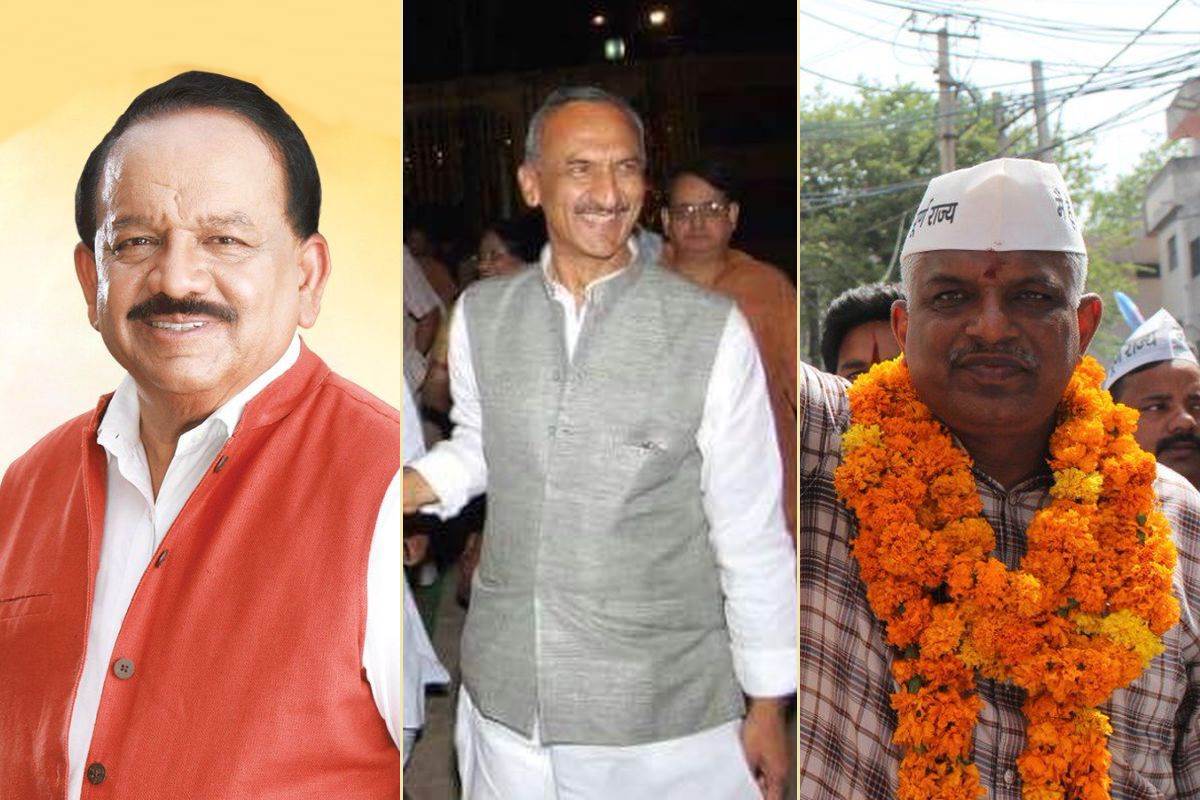LS vote referendum on reservation: Telangana CM
The Telangana chief minister also accused the BJP of trying to stop OBC reservation put forward by the Mandal Commission.
The Chandni Chowk contest is between sitting BJP MP Dr Harsh Vardhan, JP Agarwal of the Congress, and AAP’s Pankaj Gupta

Dr Harsh Vardhan (BJP), JP Agarwal (Congress) and Pankaj Gupta (AAP)
The issues dominating the poll discourse in the Chandni Chowk Lok Sabha constituency include the GST, demonetisation and the sealing drive, which have affected a large section of traders and other voters here, who have mixed views about them.
With 15,62,268 voters, Chandni Chowk is the smallest parliamentary constituency in Delhi in terms of electorate. It comprises of 10 Assembly segments including Adarsh Nagar, Shalimar Bagh, Shakur Basti, Tri Nagar, Wazirpur, Model Town, Sadar Bazar, Chandni Chowk, Matia Mahal, and Ballimaran.
Seven of these Assembly segments have some of the biggest wholesale markets and industrial units in the national capital. These include trading centres of Chandni Chowk, Matia Mahal, Ballimaran, Sadar Bazar, Model Town, Wazirpur and Tri Nagar.
Advertisement
In the past, the Chandni Chowk parliamentary seat used to be a Congress stronghold, but the BJP wrested it in the 2014 general elections. In the current Lok Sabha polls, a triangular contest is in the offing, even as the BJP appears to have the edge.
A large section of traders of these areas still could not revive from the effects of the GST and demonetisation. “Our profit margin has reduced sharply soon after the implementation of GST,” said Pravin Ahluwalia, a trader at the Chandni Chowk market.
Small-time traders, who had been running their units out of temporary structures and could not get them registered in government records, were worst-hit by the GST. Since a permanent address is needed to procure a GST number, many of them were forced to move businesses elsewhere, said Pravin Kumar, a shop owner in the Sadar Bazar market area.
Another section of local traders, however, said that when the GST was introduced it was “very complicated” for them to comply with it, but now GST has become “easy” for them. “AAP is better for Delhi and BJP should rule at the Centre,” said Ashok Agarwal, a Chandni Chowk trader. The BJP still seems to be a popular choice for the traders, who have traditionally been part of the the party’s core vote base.
While a number of Shalimar Bagh residents support the AAP for the Lok Sabha election, some Adarsh Nagar residents believe that voting for an AAP candidate for this election would not “make much sense”.
“AAP alone can never form government at the Centre. We had high hopes from Arvind Kejriwal when he was fighting against corruption. But we have lost our hopes when he was trying to form an alliance with the Congress,” said some voters in the Shalimar Bagh area. “This time we are not going to vote for Harsh Vardhan (sitting BJP MP), but for PM Narendra Modi who seems to be again forming a government for the second term,” said Raj Kumar, a Sadar Bazar trader.
Another major issue in Chandni Chowk has been the sealing drive carried out by the BJP-ruled civic bodies. A large number of shop owners have lost their shops because of it.
Many voters also seemed to be unhappy over congestion and parking problems throughout this constituency. Even an ambulance could not enter in most of the areas of Chandni Chowk, Matia Mahal, Ballimaran, Sadar Bazar areas, alleged Motilal Sharma, a resident of Matia Mahal.
Harsh Vardhan, Union minister, has claimed that the GST has not undermined people’s faith in PM Modi. In Chandni Chowk, he said, a massive reconstruction project has been underway that will address problems like congestion and parking for the wholesale markets.
Vardhan said the sealing drive had been ordered and monitored by the courts. “We will examine all options and seek solutions for it within the constitutional framework, including legislation, if required,” he said. The GST has already been refined and simplified since its introduction, the minister said.
In 2014, Vardhan had defeated the AAP’s Ashutosh by over a lakh votes while the Congress’s Kapil Sibal had come third.
In 2008, when a delimitation exercise was undertaken, several North Delhi neighbourhoods such as Model Town, Tri Nagar, Wazirpur, Shalimar Bagh and Shakur Basti were made part of this constituency, which accounts for about 15 per cent Muslim voters that was 30 per cent before delimitation. The percentage of voters of the SC and OBCs have gone up to about 25 and 20 respectively post delimitation while the Vaish community accounts for 10 per cent voters.
“Muslims place little faith in the BJP, not because they don’t like Harsh Vardhan, but since voting for Narendra Modi may separate them from the community in the area,” said Abdul Haq, a resident of Wazirpur.
“Muslims here have been voting for the Congress. But many of them have shifted their allegiance to AAP for the work it has done on the ground,” said Arabul Islam, who owns a book store at Wazirpur.
The Congress has fielded its veteran leader J P Agarwal, a local from Chandni Chowk’s Parathe Wali Gali, who had fought his first Lok Sabha election from the area in 1984 and has represented the constituency thrice since then.
“Earlier the constituency had just about five to six assembly segments with around 6-7 lakh voters which one could cover entirely in a padyatra. The area is much bigger now and so are the challenges,” said Agarwal.
In Adarsh Nagar, Jahangirpuri and Shakur Basti, mainly comprising of unauthorised colonies and jhuggi-jhopri (JJ) clusters, basic amenities such as piped water supply, sewerage and proper roads remain the key issues.
The AAP has fielded a newcomer Pankaj Gupta, a software professional, who is contesting an election for the first time. He has listed women safety, unemployment and sealing among the major poll issues.
CLICK FOR MORE 2019 ELECTION NEWS
Advertisement